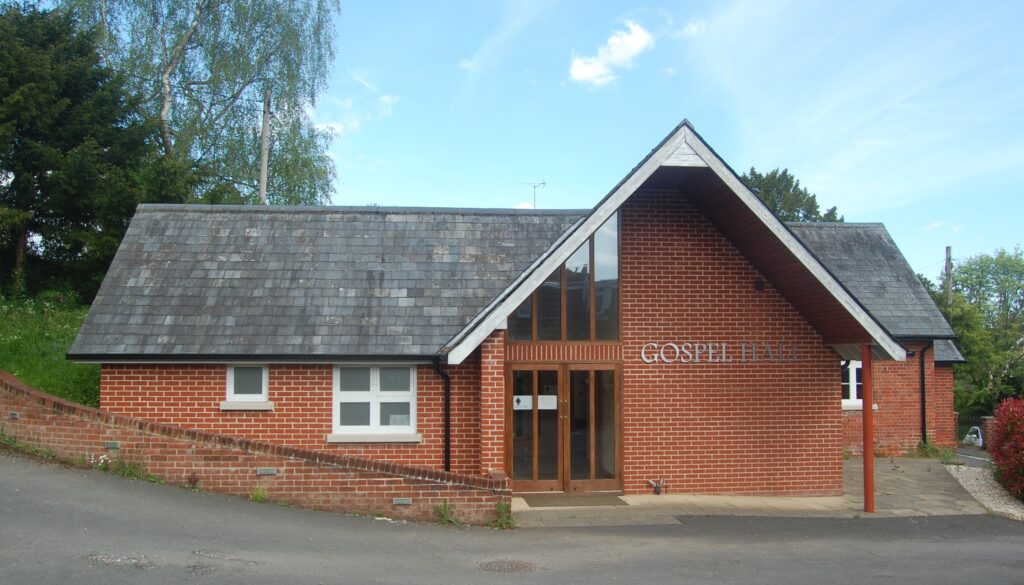
The Bible Chapel is the meeting place of a company of Christians who gather together in the name of the Lord Jesus Christ alone. They have learned from the New Testament scriptures that denominationalism is not only unknown in its pages, but its very idea is unsparingly condemned. See 1 Corinthians 3:1-7. In view of this fact, they meet together, simply as believers in the Son of God, entirely apart from any denomination or organized federation, nor do they have any sympathy with the many false and fanatical sects which are so prevalent in these days.
Seeing that the division of Christians into various parties, or denominations, is not in accordance with the Word of God, they therefore seek to meet, in scriptural simplicity, as Christians who have already been joined, by the Spirit of God, to the body of Christ, the Church, of which the Lord Jesus Christ is the sole Head, and every regenerated person a member. See I Corinthians 12:13; 6:17.
In the light of this scriptural truth concerning the Church, they seek to recognize and act on this revelation of the unity of the body of Christ. They have no desire to separate from other believers, but only from those things which are contrary to the revealed will of God, as found in His holy Word. See Ephesians 4:1-6.
The existence of this Chapel does not represent another denomination of Christians, who are separated from other believers by humanly constructed barriers in the form of creeds, government or books of discipline, etc., but is the meeting place of a company of Christians who refuse to recognize either denominationalism or interdenominational, and are sincerely endeavoring to “keep the unity of the Spirit (which God has already made) in the bond of peace” Ephesians 4:3.
It logically follows that all true Christians who are sound in the fundamentals of the faith and morally clean in their lives, will be warmly welcomed to enjoy Christian fellowship with them on no other condition than that they “belong to Christ” (Mark 9:41).
Seeing that the New Testament describes but one body, the Church, to which every believer has already been united by the Spirit of God, and that there is but one Head to that body, the Lord Jesus Christ, there can therefore be no room in the world for many bodies with many heads such as we see in Christendom today. Thus such expressions as: “My own Church preference,” or “The Church of my choice,” is entirely foreign to Scripture.
It will also be observed that, in the New Testament, all the titles given to believers are common to and inclusive of all who have been united to the Son of God. Such names as “Christians,” (Acts 11:26; 26:28; 1 Peter 4:16); “Believers,” (Acts 5:14; 1 Timothy 4:12); “Children of God,” (Galatians 1:2) are thus seen to be inclusive of every true Christian on the face of the earth. The man-given titles, such as are commonly used today to distinguish the various denominations, are not inclusive of all believers, and consequently must be viewed as being unscriptural.
Perhaps a word may be in order as to the ordinances observed. An ordinance, to be valid for the believer, should meet a threefold test. First, it must be definitely commanded by the Lord Jesus, as recorded in the Bibles. Second, it must be practiced by the apostles, as described in the Acts. Third, its spiritual significance must be clearly expounded in the Epistles. Only two ordinances meet this threefold test: Baptism and the Lord’s Supper.
Baptism, which is by immersion in water, is for believers only, and should follow conversion to Christ. It is the God-given figure, or illustration, of the Christian’s identification with Christ in His death, burial and resurrection, and constitutes his confession to others of this fact. It has no saving value, but is an act of obedience to the Lord who commanded it. See Matthew 28:18-20; Acts 8:26-39; Romans 6:3-6.
The Lord’s Supper was instituted by the Lord Jesus on the night of His betrayal and exists for the purpose of remembering Him. The bread is the Divinely appointed symbol of His holy body given for us, and the cup is the symbol of His precious blood, by which He secured our eternal redemption. See Matthew 26:26-29; Acts 20:7; 1 Corinthians 11:23-24. Again, there is no saving virtue in this ordinance. It is the privilege of all the Lord’s people, who are sound in life and doctrine, to thus “show the Lord’s death until He come” (1 Corinthians 11:26).
The gospel of the grace of God is also taught and preached in the Chapel, both in the Sunday School and in the Bible service. All who come will hear a clear presentation of the sinner’s need of salvation; God’s wonderful provision for that need in the love gift of His beloved Son; Christ’s substitutionary sacrifice of Himself, by which He accomplished all the work needed for the salvation of every sinner who will trust Him as his own personal Savior, and confess Him as the supreme Lord of his life. See John 3:14-19; Romans 3:10-26;10: 9-10.
At such Bible services no collections of money are taken. Our Lord’s words are taken literally: “Freely ye have received, freely give” (Matthew 10:8; 1 Corinthians 9:18). The Bible teaches that the Lord’s work should be supported by the Lord’s people alone. Needless to say, all are most cordially invited and will be warmly welcomed to both the Sunday School and the Bible meeting. Should any desire to be visited in their homes, it will be considered a privilege, and all such requests will be honored promptly.
The following fundamental truths of the holy Scriptures are held and taught by those who meet at the Chapel.
1 The Divine trinity of the eternal Godhead, consisting of Father, Son, and Holy Spirit. Not three Gods, but one Godhead subsisting in three Persons, each equal and eternal with, each other. See Matthew 28:19; John 15:26; Hebrews 9:13-14; Ephesians 2:18; 2 Corinthians 13:14.
2 The essential and eternal Deity pf the Lord Jesus Christ, the Son of God. Ris virgin birth, sinless humanity, substitutionary sacrifice for our redemption, bodily resurrection, ascension, glorification, present ministry at the right hand of God, and His literal and personal second coming. See Hebrews 1:8; Luke 1:26-35; 2 Corinthians 5:21; 1 Peter 2:22; 1 Corinthians 15:34; 1 Timothy 2:5-6; Acts 1:6-11; Hebrews 4:14-16; 1 Thessalonians 4:13-18.
3. The Deity and Personality of the Holy Spirit, Who inspired the writing of the Bible, Who convicts the sinner of his lost and guilty state before God and, on the sinner’s acceptance of Christ as his own personal Savior and Lord, regenerates, in-dwells and empowers him to live a godly life and effectually serve the Lord Jesus on earth. See 2 Peter 1:19-21; John 16:7-15; Ephesians 1:13-14; 1 Corinthians 6:19-20.
4 The Bible is the Divinely inspired, authentic and authoritative Word of God, and is therefore the Christian’s complete guide on all manners of faith and practice. See 2 Timothy 3:14-17; Matthew 24-25; Psalms 119:11,89, 105.
5. The salvation from sin’s penalty, secured at the infinite cost of the precious blood of Christ, has been provided for every sinner who will avail himself of it. This salvation Is wholly of grace, and therefore entirely apart from human merit in any shape or form. It is conditioned by simple faith in Christ’s finished work of redemption, which He accomplished on the cross, acceptance of Him as one’s own personal Savior and confession of Him as the Lord of the life. See John 3:14-18; 5:24; 10:9; 14:6; Romans 10:9-10; Ephesians 2:8,9 :Romans 4:15; I John 5:13.
6 Each regenerated believer Is not only eternally secure in Christ, but, by the Holy Spirit, has been united to the body of Christ, the Church, of which Christ is the Head, and every believer a member. See John 10:27-30; 1 Corinthians 12:12-27; Ephesians 1:15-23.
7 The eternal retribution of God upon all who die in their sins, either rejecting, despising or neglecting the great salvation provided by the redemptive sacrifice of the Son of God. See John 3:36; 8:21-24; 2 Thessalonians 1:7-10, Hebrews 2:3; Revelation 20:11-15. Such, in brief, is the explanation for the presence of the Bible Chapel at the address indicated. To its preaching services you are most cordially invited to attend. In the words of another, they too would say: “Come thou with us, and we will do thee good” (Numbers 10:29).
Alfred P. Gibbs
